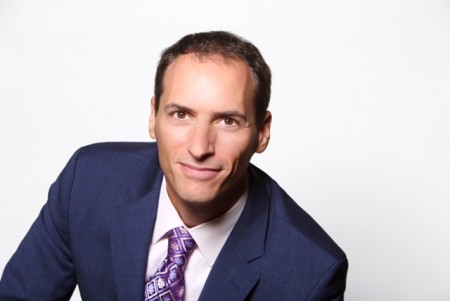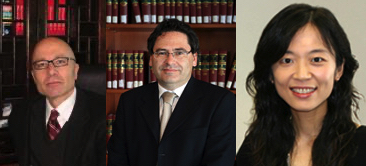Are we entering a new era of legal education during the novel coronavirus crisis?

Ari Kaplan. Photo by Lauren Hillary.
Ari Kaplan recently spoke with Lutz-Christian Wolff, Stephen Gallagher and Joyce Wong—the dean, associate dean for teaching and learning and the faculty secretary, respectively—of the Chinese University of Hong Kong's law faculty, about the COVID-19 pandemic and a potentially new era of legal education.
Ari Kaplan: Tell us about the faculty of law of the Chinese University of Hong Kong.
Lutz-Christian Wolff: The school was founded in 2005, and we strive to be quite innovative and dynamic. We also have a young faculty that represents over 20 jurisdictions around the world. We started with particular goals and were able to tailor our teaching programs to the needs of our students, so that they can enter legal practice equipped with the skills they need to thrive.
Ari Kaplan: What is unique about the university’s approach to legal education?
Stephen Gallagher: We have been using various techniques and formats from different jurisdictions in our teaching. We also employ a combination of professors and practitioners. Many members of our permanent staff have practice experience and bring ideas from those roles that work really well. This gives our students a really unique experience.
Ari Kaplan: Given the international nature of your faculty, how do you harmonize and align all of their experiences in different jurisdictions?
 Lutz-Christian Wolff, Stephen Gallagher and Joyce Wong.
Lutz-Christian Wolff, Stephen Gallagher and Joyce Wong.
Stephen Gallagher: We think it is a benefit to have all of these different experiences in legal education and professional practice to support our students. We also emphasize the comparative study of law and research developments, as well. We do not encourage a singular education. Rather, we try to create international lawyers that are able to work in different jurisdictions based on the knowledge and skills we convey.
Ari Kaplan: When did you first realize that the coronavirus would impact the school’s operations?
Joyce Wong: We are always fast in responding to change. In early January, when the news from China broke about the coronavirus, we realized that the outbreak would impact our school’s activities. We took immediate action by switching our operations online. We did not just introduce alternative modes of teaching, but we also helped set up home offices to support the conversion process. We maintain our administration at full capacity to support a range of services, not only teaching but other academic pursuits, seminars and public discussions, so that students, staff members, applicants, alumni, practitioners and those in the general public can engage with each other. We have tried to minimize the adverse impact of the virus while continuing to create new opportunities.
Ari Kaplan: Tell us about the decision to adapt to the rapidly changing situation.
Lutz-Christian Wolff: We did not close the school. Rather, we simply moved our operations online. We were quite lucky that we had experience working online, and we just switched. It was hard, but it worked quite well and everybody immediately adapted. We also saw that this new operational model might offer the opportunity to further train students for practice since a lot of the legal work that law firms and in-house teams perform is actually online. As a result, switching to an online format enhances the training and educational opportunities for our students. I really think it has worked out well so far.
Ari Kaplan: How have you altered your teaching style and methods to support students in the current crisis?
Stephen Gallagher: The move online has helped the training mirror how students will eventually practice. Our faculty training guides and instruction for staff and students on using our technology suite was central to our planning, so that everyone could fully leverage the school’s resources. In addition to educating our students, we provide content to the local legal community, and our online seminar series has become extremely popular. We were even surprised by the interest. It seems like there was a broad need for continuing professional development and other interesting programs for local practitioners. While we started organizing them periodically for our students and local contacts, we decided to develop at least five seminars a week of this type to make up for some of the experiences that the students were losing due to the elimination of traditional campus life. We have been attracting between 500 and 1,000 registrants for our seminars, so we will continue organizing them.
Ari Kaplan: Have you found resistance from the individuals working remotely or those who are engaged in distance learning?
Joyce Wong: Our administrators are quite adaptable to rapid change and comfortable working from home. We don’t actually consider the student experience as distant learning because we offer interactive online teaching combined with interactive online activities. While there may be some initial resistance when you introduce changes, it can be easy to overcome with strong leadership. As the school’s leaders promote these new options, adoption increases. The keys to success in addressing resistance are patience and communication. We all need to try to be more positive and focus on each concern directly.
Ari Kaplan: Can student performance be fairly evaluated in a remote learning environment?
Lutz-Christian Wolff: While in-class assessments have certain advantages, online assessments also have positive attributes and take-home assignments have been a well-established mode of evaluation for many years. I believe students need to organize themselves as part of the learning experience, and we should encourage group work. The issue is about the mechanics of an online exam. While there is the risk of cheating remotely, that same concern exists with in-class exams, but in either case, we are not concerned because we trust our students.
Ari Kaplan: Which elements of the school’s remote model will remain when students return to campus?
Stephen Gallagher: I think the experience that we’ve had in going online will change our learning and teaching environment completely in the future. We all enjoy direct interaction with students in person, but my students have been promoting some of the benefits of working remotely. And in September, we are introducing the first legal technology course in Hong Kong because we realize now more than ever that our students have to be adept at this. It will be part of the future of their legal practice and reflects the direction of legal education. We also made the decision to move our biennial legal education conference, “Directions in Legal Education 2020,” scheduled for June 18 to 20, 2020, online. It expands our reach and enables us to offer content to more attendees and secure new speakers.
Lutz-Christian Wolff: Our students who have embraced the online experience and have familiarized themselves with the various options have found success. Recently, our school’s team won an international moot court-style event, which was conducted online for the first time. I am almost sure that the experience they have had with our remote sessions helped tremendously to cope with the event’s digital challenges and overcome any fear of working online. We just need to be positive about this whole development.
Listen to the complete interview at Reinventing Professionals.
Ari Kaplan regularly interviews leaders in the legal industry and in the broader professional services community to share perspective, highlight transformative change and introduce new technology at his blog and on iTunes.
Write a letter to the editor, share a story tip or update, or report an error.


